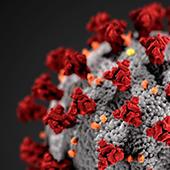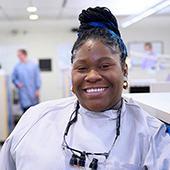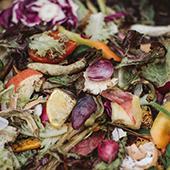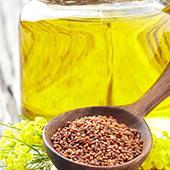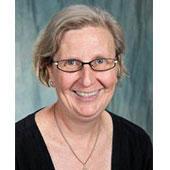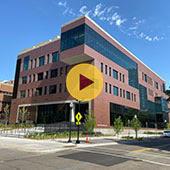- Regents special meeting highlights.
- Features: Researchers developing SARS CoV-2 spike proteins; Finding her fit in dental therapy; Drawing renewable resources from organic waste.
- People: U of M Institute for Engineering in Medicine and collaborators receive $26M for NSF engineering research center; and more.
Regents special meeting highlights
U of M Regents hosted a special meeting on July 30 to approve amendments and clarifications to a variety of Board and administrative policies to address fall semester deadlines and federal directives related to handling sexual misconduct under Title IX. The Board also discussed details of the University’s COVID-19 testing and response plan: MTest. The testing plan is one component of a comprehensive plan to reduce the spread of COVID-19 during fall 2020. For more information about other aspects of the University’s approach, see z.umn.edu/covid19. See the news release for more details.
Researchers developing SARS CoV-2 spike proteins
Scientists across the world are racing to solve the biological puzzle that is the coronavirus. In order to speed up the process, College of Science and Engineering (Twin Cities) professor Wei-Shou Hu and his lab aim to supply a key part of that puzzle. Hu is working with researchers in the University of Minnesota Medical School to create a cell line that can rapidly produce SARS CoV-2 spike proteins.
Finding her fit in dental therapy
Sometimes all it takes are a few encouraging words to alter the trajectory of a young person’s life. For Jackie Callaway-Campbell, those came from a manager when she worked as a dental assistant in New Castle, DE. In a conversation with that manager, she learned about the emerging field of dental therapy and a unique program 1,200 miles away at the University of Minnesota.
Drawing renewable resources from organic waste
Spoiled food, manure, sewage—for most people, the less time thinking about these things, the better. For scientists at the University of Minnesota, however, these forms of waste hold enormous potential. Right now, a team of researchers from the U of M’s BioTechnology Institute, with funding from MnDRIVE Environment, are looking to turn organic waste into heat, energy, and fertilizer.
People
U of M Institute for Engineering in Medicine and academic collaborators receive $26M for NSF engineering research center; Forum Kamdar is one of 17 physician scientists in the U.S. to receive a $495,000 award from the Doris Duke Charitable Foundation; 2020-21 Doctoral Dissertation Fellows; 2020-21 Endowed Fellowship recipients; U in the News features highlights of U faculty and staff cited in the media.
University offers incentive for early retirement
The University is offering a one-time retirement incentive for qualifying employees. The Retirement Incentive Option provides a $38,000 contribution to the State of Minnesota’s Health Care Savings Plan for those who retire before Jan. 15, 2021, and meet eligibility requirements. The contribution can help employees fund their future health care costs—including UPlan premiums—in retirement. The enrollment period is Aug. 17-Oct. 19.
U of M Bookstores pivot to online-only ordering
To ensure the safety of customers and staff, U of M Bookstores (Crookston, Morris, Rochester, and Twin Cities campuses) are pivoting to online ordering only for all course materials. This operational change also ensures all students receive the correct materials, as online ordering is linked to each student’s course registration. To help facilitate this change, U of M Bookstores is offering standard shipping at no charge in the continental United States on all course material orders placed online through Aug. 31.
Distinguished McKnight nominations for 2021 awards
Nomination instructions for the 2021 Distinguished McKnight University Professorships are now available. The program recognizes professors at different career stages. Nominations are due Jan. 26.
Call for proposals: Rapid Response Grants Program
The Global Programs and Strategy Alliance (GPS Alliance) has announced a new rapid response grant competition as part of its systemwide initiative focused on Sustainable Development Goals (SDGs). Grants will support current faculty, academic staff, and graduate students to use the SDGs as a framework to help address the many challenges that are arising locally and globally, including the COVID-19 pandemic and the global movement to eradicate racism.
Anticancer drug may be more effective in treating COVID-19 than remdesivir
Ricardo Battaglino, Department of Rehabilitation Medicine, teamed up with colleagues to study the use of apilimod in treating COVID-19. Early results, using cell culture work, show that the drug is five times more effective than remdesivir.
Official estimates of public health spending are significantly overinflated
In the months before the COVID-19 pandemic began, the U.S. federal government released its annual estimates for how much the nation spends on health. A small fraction of the $3.6 trillion dedicated to health spending—an estimated $93 billion—is allocated to governmental public health at the federal, state, and local levels. However, a new study by researcher JP Leider reveals that federal estimates overestimate actual public health spending by as much as two-thirds.
Surveying social interactions during the pandemic
Professor Shalini Kulasingam is leading a survey of Minnesotans to learn about their daily social contact patterns during the coronavirus outbreak. The data from the study will be incorporated into one of the models used by the State of Minnesota to plan its response to the pandemic.
Wellbeing strategies for coping with COVID-19 anxiety
If you are experiencing heightened anxiety or worry about the pandemic, you’re not alone—and there are steps you can take to start feeling better. Visit "Taking Charge of Your Health & Wellbeing" to explore strategies to reduce and cope with COVID-19-related anxiety, including exercising, walking in nature, eating to support your wellbeing, connecting with friends, and learning new relaxation techniques.
The science behind dietary guidelines for Americans
Every five years, the U.S. Department of Agriculture (USDA) and U.S. Department of Health & Human Services (HHS) develop the Dietary Guidelines for Americans. To craft the 2020-25 guidelines, the USDA and HHS will review the scientific report from an advisory committee made up of 20 experts from across the U.S. One of those experts is School of Public Health associate professor Jamie Stang. Here, Stang discusses what’s different about the report this time around, what’s controversial, and what the committee members learned that surprised them.
Showcasing new oilseed crops from farm to table
Two new winter hardy annual oilseed crops—winter camelina and pennycress—are making their way onto fields, into the supply chain, and onto the dinner table in Minnesota, thanks to efforts by the University of Minnesota Extension Regional Sustainable Development Partnerships and The Forever Green Initiative. Applied researchers are developing these cover crops to protect water, soil, pollinator habitat, and the climate, while spurring innovation, new economic opportunities for growers, and new products for consumers.
Research Brief: ‘Fool’s gold’ may be valuable after all
In a breakthrough new study, U of M scientists and engineers have electrically transformed the non-magnetic material iron sulfide, also known as “fool’s gold” or pyrite, into a magnetic material. This is the first time scientists have ever electrically transformed an entirely non-magnetic material into a magnetic one, and it could be the first step in creating valuable new magnetic materials for more energy-efficient computer memory devices. Additional recent Research Briefs include “New study explores how coronavirus travels indoors,” “Rural nurse practitioners work with more autonomy than urban nurse practitioners,” “Food insecurity raised risk for disordered eating in low-income adolescents,” and “Best predictors of romantic relationship success.”
Virtual Canvas Clinics
Faculty and instructors are invited to register for a Virtual Canvas Clinic session, to be held on Aug. 26 between 10 a.m. and 1 p.m., and Sept. 3 between 12:30 and 3:30 p.m. Participants will get hands-on support and consultation on setting up course sites, creating activities and assessments, and integrating media or other course resources into Canvas.
U of M featured virtual events
Aug. 5 - Walking the Talk: Practicing Restorative Justice and Anti-Racism
Aug. 19 - Mindfulness-Based Stress Reduction Program: History, Evolution and Possible Benefits
Aug. 24 - Navigating Transitions and Change
Aug. 28 - Webinar Series: COVID Controversies—Ethical Challenges in Research & Treatment
U of M Crookston selected to join First Generation Network
The Center for First-generation Student Success, an initiative of NASPA and The Suder Foundation, has named the University of Minnesota Crookston to its inaugural cohort of First Scholars Network institutions. The University of Minnesota Crookston was selected to join the network after demonstrating a commitment to advancing the outcomes of first-generation students through improving student success initiatives and institution-wide approaches.
Student-led publication
Professor Elizabethada Wright, Department of English, Linguistics, and Writing Studies, is the faculty advisor to a new online peer-reviewed publication, The Duluth Journal of Advanced Writing. The journal was created in Wright’s class on electronic publication and features articles written by UMD undergraduates and recent undergraduate alumni. Students involved in the publication also learn about design, marketing, and editing.
An Enemy of the People honored
The Kennedy Center American College Theatre Festival gave national awards to UMD’s production An Enemy of the People, which was performed at regional competitions in January. The show received the Distinguished Production of a Play award. Theater professor Tom Isbell, who adapted the play and directed it, received the Distinguished Director of a Play award.
Indigenous rights
Becca Gercken, chief diversity officer and associate professor of English and Native American and Indigenous Studies, is quoted in “Resist comparing Canada, U.S. on Indigenous rights, say experts, activists.” A 2017 winner of the Horace T. Morse-Minnesota Alumni Association Award, Gercken is an expert on representations of Native and Indigenous peoples in books, film, and television, and on federal Indian policy.
Fall 2021 application for admission now open
Graduates of UMR's Bachelor of Science in Health Sciences program are prepared to solve the grand health challenges of the 21st century. Applications for the fall 2021 Bachelor of Science in Health Sciences program are now being accepted.
Reimagining county services in the time of COVID
When the coronavirus reached Minnesota, Ramsey County joined many other local governments in bringing the services it offers to residents online. The problem, however, was that not everyone in the county could access these services. Ramsey County staff reached out to U of M researchers to collaborate on finding new ways to provide social services, legal services, permits, and more. While the project was initially designed to help Ramsey County come up with short-term solutions, the focus has expanded to think about how to meet residents’ needs after the pandemic, too.
Hepatology expert studying ‘the silent epidemic’—Viral Hepatitis B
Mohamed Hassan, professor in the Department of Medicine, discusses his research on Hepatitis B virus—a type of viral hepatitis that disproportionately impacts the immigrant population in the Twin Cities.
Sneak peek of HSEC
The state-of-the-art Health Sciences Education Center (HSEC) is one of the most comprehensive interprofessional education facilities in the country. As the new hub for U of M health professional schools, HSEC’s spaces promote interprofessional education and teamwork, as well as foster a culture that values student and faculty well-being. Watch a short video preview of the building.
